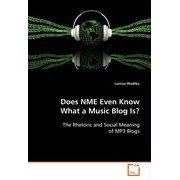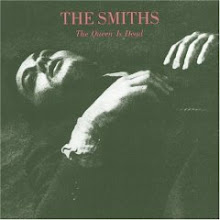 This post is another double feature to showcase two different electronic records that I'm excited about right now. The first is the debut album from Northern Irish trio The Japanese Popstars (We Just Are due to release in North America in January 2009) and the second is the fifth album from Jon Ryman (Nineteen Eighty-Four which just released this year). The former has gritty, dirty beats akin to Justice, Boys Noize and MSTRKRFT while the latter emulates smoother synthpop similar to The Human League, Depeche Mode and New Order.
This post is another double feature to showcase two different electronic records that I'm excited about right now. The first is the debut album from Northern Irish trio The Japanese Popstars (We Just Are due to release in North America in January 2009) and the second is the fifth album from Jon Ryman (Nineteen Eighty-Four which just released this year). The former has gritty, dirty beats akin to Justice, Boys Noize and MSTRKRFT while the latter emulates smoother synthpop similar to The Human League, Depeche Mode and New Order.Consisting of Declan McLaughlin, Gary Curran and Gareth Donoghue, The Japanese Popstars are exactly what I want to hear on the dancefloor. We Just Are begins aptly with We Just Are (Intro) - a confident declaration that pulses with metallic starbursts around the simple vocal sample. From here, you are taken into a world of fantastically brash and hypnotic electro, where you are under their purview and held in compliance with your will. The first track proper, Sample Whore, built around samples of "ohs" and "ahs," is a perfect blend of the lusty and clinical while Face Melter does just what it says on the tin (I'm still trying to mop up the remainder of my face from the floor). Then Delboys Revenge kicks in with a jackhammer insistence, but a needle-like precision soon backed by lasers that slice through your cranium.
As a refreshing reversal to the assault of Delboys Revenge, B.C.T.T. provides a gentler, poppier side with breathier rhythms and the heart rate comes down for awhile as the delicacy of the track washes over you like cool antiseptic. Dr. Frenchy Bernard continues the gentler arc with springy synths and old-school bleeps, creating a mini electro symphony. Anthepic (We Have Taken Over) begins to bring back harsher, dirtier beats, smudging up the otherwise pristine technicality of the track, and by the point the wispy vocals that declare "Just like you asked us to, we have taken over you" increase into a hynotic maelstrom, you realize that they have indeed taken over. Rising slowly from beneath the previous track, The Smile wends its way insidiously and surreptitiously into the folds of your grey matter.
However, it only serves as an introduction to the epic Rise of Ulysses, a whizzing, buzzsaw return to the grimier earlier tracks of the album. With its demonic chant of "rise!" at various points, it injects a darker pigment into the heart of the record. With rapid metallic beats and clipped cymbals, Total Distorted Mayhem, like Face Melter, is rather self-explanatory. A barely detectable "Come in, just jump in" pulses between rhythms like a shadow of an Id. The next track, F19b (Droppin' Bombs), definitely sounds like bombs dropping in a constant loop, ultimately merging to sound like a siren against gritty, hollow beats. Like most of the tracks on this record, it puts you into a rather pleasurable trance. To tie the album up in a consistent circuit, it ends with We Just Are (Finalizer), once again deliberately declaring their existence. It builds from a low hum into scales of fuzzy tonalities before bursting rather unexpectedly into sunny, jubilant melodies, like pure endorphin being shot into your veins. The Japanese Popstars have also just released a free download of an unreleased track called Electronic Poet, which is equally as brilliant as the album and which I've made available below. If I opened my skull right now, I have a feeling The Japanese Popstars would be tattooed all over the surface of my cerebrum.

Unlike The Japanese Popstars, Jon Ryman's music is on the softer, synthier side of electronic music. I was actually made aware of the Brighton-based artist several months ago via MySpace, but I didn't take a proper listen until now. Ryman has been creating music since the '80s (including under the name Interloper) and has also worked on music for television. This particular album - Ryman's fifth studio album - is loosely based on George Orwell's 1984, the book that has spawned many a song and record. However, rather than seem clichéd, this record breathes new life into the seminal story, especially with its classic analogue feel. Somehow it is hugely fitting that an old novel set in the future, which is now the increasingly distant past, is set to new music in a style that was considered futuristic decades ago. Ryman also pushes Orwell's ideas into the 21st century, demonstrating how visionary Orwell was in predicting that everyone would eventually experience information overload to the point of apathy, a world where everything is propaganda and everything is under surveillance.
The album begins with an introductory message delivered by a voice from a retro computer that promises to play a happy song for you. The first track proper is New Corporate Mass, which ticks away like a hollow machine before pulsing with sparkly waves of synth and a rather robotic Latin hymn sung by a vocoderized human in a world in which the new religion is controlled by the corporations via the government. The album then shifts into Humanized, one of the catchiest tracks on the album. It slinks along to a cabaret feel and features one of my favourite lyrics: "a paper tiger in a cage." Overexposure places the Big Brother-induced paranoia against a relatively deadpan vocal and a backdrop of some of the best New Wave synthpop I've heard lately. Its sentiments display the ever-present (and ever-realistic) problem of minds being inundated with unwinnable wars and loaded terms that mean nothing to keep them from thinking critically. Breaking through this noise, Julia, an ode to the protagonist, Winston's, love interest in the novel, is full of crystalline synthesizers, reflecting a New Wave dancefloor beneath a discoball made of ice and circuitboard. The narrator of the song, who we can assume is Winston, appears to be experiencing a reawakening, shaking off apathy for a moment and attempting deeper thoughts, including rather profound ones like "maybe I'm just circumstance, nothing more." The next track, Autocue, flows along to a beat reminiscent of Tears For Fears' Everybody Wants to Rule the World as what sounds like telephone rings tinkle in the background. It becomes the perfect atmosphere for lyrics telling how the monolithic corporation assumes its own impersonal, singular soul, acting as an individual driven by greed and drained of humanity while running on automatic pilot. Autocue drifts seamlessly into Stars Fall, which returns to vocoder and beautiful, soaring melody.
Breaking this dreamlike mood, Rhythm Machine begins with the same computerized voice from the intro asking you to enter an access code. The song then moves into clinical vocals paired with razor-sharp precise rhythm worthy of Kraftwerk, contrasting with the free-flow of the movement in Julia - this is what dance music is when computers create it on their own. Oneohone, which is named for the dreaded Room 101 of the novel, begins with echoey snatches of voices and random sounds before ominous synths slip in to create an air of nightmare and imprisonment. Beginning with whizzes and static, Omnipresent continues the dark, horrific feel of Oneohone, setting a scene in which fear is palpable. Nowhere Left To Run follows with a rather restrained rhythm framed by further whizzes as a rather resigned vocal sings the song's title over and over. The record concludes with Acid Music, a bouncy, scrambled track that sounds like both a mental collapse and a system failure, poignantly demonstrating our propensity for treating machines like humans and humans like machines: machines get viruses while humans break down. Nineteen Eighty-Four is retro, but never cheesy, which is quite an achievement, and I hope Ryman gets more of the attention he deserves for this record.
Currently, you can order We Just Are from Amazon UK and you can purchase Nineteen Eighty-Four at CD Baby. Oddly enough, both albums, though very different, reinforce some similar notions of technology and humans and how we are both just made of information, whether DNA or binary code.





















































2 comments:
The Popstars ARE very cool. Enjoyed your review. Have you seen their latest video for Face Melter?
http://www.youtube.com/watch?v=AknY-tcKE-s
Comments welcomed!
Blu Ray Converter
Convert Blu Ray Mac
Convert Blu Ray to AVI
Convert Blu Ray to DivX
Convert Blu Ray to MKV
Convert Blu Ray to MOV
Convert Blu Ray to MP4
Convert Blu Ray to MPEG
Convert Blu Ray to MPEG2
Convert Blu Ray to MPEG4
Convert Blu Ray to VOB
Convert Blu Ray to WMV
Convert Blu Ray to Xvid
Convert Blu Ray to HD
Convert Blu Ray to HD WMV
Convert Blu Ray to iPod
Convert Blu Ray to PS3
Convert Blu Ray to PSP
Convert Blu Ray to Xbox360
Post a Comment